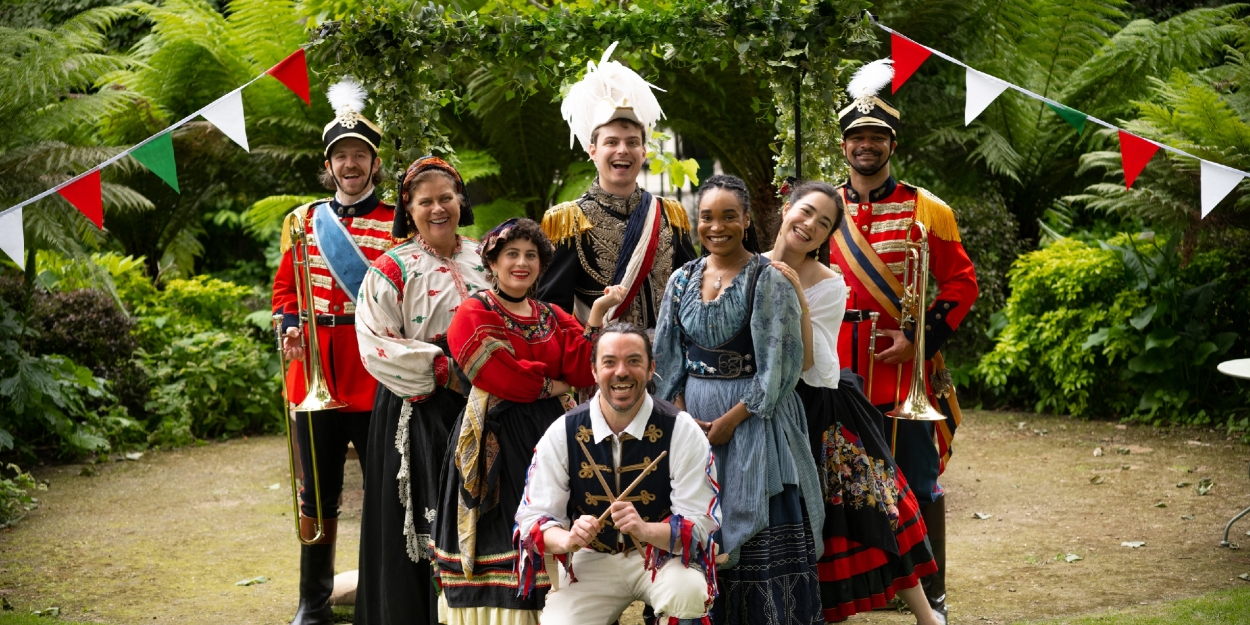Review: ALL'S WELL THAT ENDS WELL, Formosa Gardens
The production tours until 12 July


“Love that comes too late”
All’s Well That Ends Wells, a production by Shakespeare in the Square and directed by Sioned Jones, is a touring version of Shakespeare’s work, being performed in gardens across the UK.
The tale tells the story of Helena (Kalifa Taylor), a young woman living under the guardianship of the widowed Countess of Roussillon (Fiona Bruce) who falls in love with her carer’s son, Bertram (Jack Ward). Unfortunately, those feelings are unreciprocated, so when Helena is given the chance by the king to choose any man she would like to marry, chaos ensues. Bertram runs away to fight in Italy, giving Helena a challenge - if she is to take his precious heirloom ring and have his child, he will love her.
There is not much set, designed by Emily Stuart, to speak of, but it is perfectly effective in illustrating where the characters are at a given moment. There is a garden arch covered in flowers, and flags of three colours denote the edges of the stage, first appearing as blue, white and red to represent France and then green, white and red for Italy. The costumes are also simple yet sweet and I particularly loved the costumes of the Italian characters like Diana and Mariana (Claire-Monique Martin).
All’s Well That Ends Well is not one of Shakespeare’s most beloved works, with its strange plot and ending that many consider to be unsatisfying. This does not stop the performers, however, from giving their all to the script and the production as a whole. Even though her words make her appear to be a crazed fangirl for Bertram, Taylor does a fantastic job of portraying Helena, especially with the eagerness in her body language and incredibly expressive facial movements. Ward also is a great Bertram, an incredibly unlikable character that Ward interprets like a classic “frat bro” one would find in the modern world.
While the first act may be a bit slow and struggles to find itself, it grows strong in the second act, which mostly takes place in Florence, where Helena schemes with a widow and her daughter, Diana (Miya Alexandra), to trick Bertam. I particularly loved the Twelfth Night-esque scene in which the First and Second Lord Dumaine (Jacob Yolland and Lee Drage, respectively) team up with Bertram and Mariana to trick Parolles, making him believe that he has been captured and brought behind enemy lines in order to embarrass him into confession. The scene in which Helena and Diana trick Bertram is also done well, a scene in mostly silence that shows the cleverness of the two women.
One of the main issues the show has is with the wide range of vocal projection from the different performers. For example, there were several times where I struggled to hear Bruce’s Countess, but at other times I was close to covering my ears with the loudness of Toby Gordon’s Parolles. The character is meant to be an uncouth rogue, but it made the play unenjoyable when his voice was the only one I could focus on.
I am unsure if these different levels were requested by the creative team or done by choice from performer to performer. I do, however, appreciate that they did not try to use French and Italian accents, instead using their own for each character. I also struggled a bit with telling how much time had passed throughout the play and would have appreciated some signalling of a change in time, possibly through the set or the costumes.
The most bizarre choice in the show, however, is to use modern songs, turning the play into a musical of sorts, though I am not sure I would classify it as one. Beginning the show’s acts with a song is a nice way to introduce audiences into the world of Shakespeare, but having Helena sing “To Make You Feel My Love” during a more serious moment and performing the entirety of “Bella ciao” are bits that are unnecessary and did not lead to any character development, only awkward laughter from the audience.
But, while I did not love the use of modern songs, I did enjoy the instrumentals provided by the performers themselves. Music Director Annemarie Thomas has put together some great arrangements that work well for the ensemble, no matter how out of place they might be. There were also moments in which instruments were used for sound effects, which was fantastic. Whenever the king would enter, the two guards would play the trombone, heralding his entrance.
Ultimately, All’s Well That Ends Wells is a cute adaptation of the Shakespeare work, but it may have been better targeted as a show for children and families. The performers are passionate and talented but it is difficult to become immersed in the worlds of Helena and Bertram with the production going in so many different directions.
All’s Well That Ends Wells runs in various locations until 12 July
Photo Credit: James Millar
Reader Reviews

Videos

